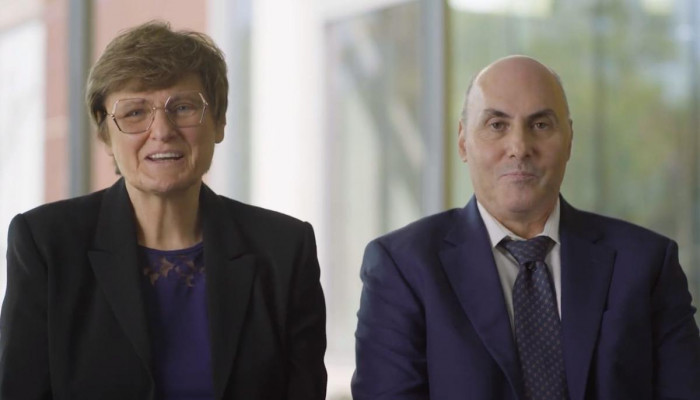Nobel Prize 2023 in Medicine awarded to Katalin Kariko, and Drew Weissman for mRNA Covid vaccines
- In Reports
- 07:54 PM, Oct 02, 2023
- Myind Staff
The 2023 Nobel Prize in Physiology or Medicine has been awarded to scientists Katalin Kariko and Drew Weissman, whose work enabled the development of mRNA vaccines against COVID-19.
Katalin Karikó is a professor at Sagan’s University in Hungary and an adjunct professor at the University of Pennsylvania. Drew Weissman performed his prizewinning research together with Karikó at the University of Pennsylvania.
The pair, who had been tipped as favourites, were honoured "for their discoveries concerning nucleoside base modifications that enabled the development of effective mRNA vaccines against COVID-19," the jury said.
“Through their groundbreaking findings, which have fundamentally changed our understanding of how mRNA interacts with our immune system, the laureates contributed to the unprecedented rate of vaccine development during one of the greatest threats to human health in modern times,” the Nobel Prize website said.
As early as the 1990s, biochemist Katalin Karikó had understood the significance of mRNA as a therapeutic. However, she and her colleague and immunologist, Drew Weissman’s research came to fruition in 2005 when they published a paper that investigated the impact of nucleoside modification and its effect on the immune system.
Further research papers published in 2008 and 2010, helped fine-tune the initial discovery and helped reduce both inflammatory responses and increased protein production thereby removing critical obstacles which hindered the clinical applications of mRNA.
In honouring the pair this year, the Nobel committee in Stockholm broke with its usual practice of honouring decades-old research.
While the prize-winning science dates back to 2005, the first vaccines to use the mRNA technology were those made by Pfizer/BioNTech and Moderna against COVID-19.
The pair will receive their prize, consisting of a diploma, a gold medal and a $1 million cheque, from King Carl XVI Gustaf at a formal ceremony in Stockholm on December 10, the anniversary of the 1896 death of scientist Alfred Nobel who created the prizes in his last will and testament.
The laureates are invited to receive their awards at ceremonies on Dec. 10, the anniversary of Nobel’s death. The prestigious Peace Prize is handed out in Oslo, according to his wishes, while the other award ceremony is held in Stockholm.
Rickard Sandberg, a member of the Nobel Prize in Medicine Committee, said, “mRNA vaccines together with other COVID-19 vaccines have been administered over 13 billion times. Together they have saved millions of lives, prevented severe COVID-19, reduced the overall disease burden and enabled societies to open up again.”
The revolutionary technology has opened a new chapter of medicine. It can potentially be harnessed to develop vaccines against other diseases like malaria, RSV and HIV. It also offers a new approach to infectious diseases like cancer, with the prospect of personalized vaccines.
The award in Physiology or Medicine is given for a significant discovery in either biology or medicine. The Nobel Prize is given for discoveries that have profoundly benefited humanity and altered the course of science; lifetime achievements or positions of scientific leadership are not eligible.
So far, 113 Nobel Prizes in Physiology or Medicine have been awarded since 1901 of which 12 have been given to women. The youngest medicine laureate ever is Frederick G. Banting, who was awarded the 1923 Medicine Prize for the discovery of insulin at the age of 32.
Image source: X







Comments